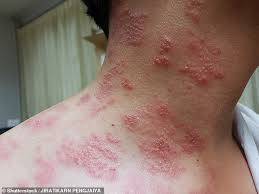Population Study Connects Shingles Vaccine with Reduction of Dementia Development

Above: Image courtesy of Neuroscience News.
Current Research into Alzheimer’s Disease
Alzheimer’s Disease (AD) is one of the most difficult and destructive age-related pathologies in the modern world. A neurodegenerative condition associated with severe memory loss, alterations in behavior, and a general loss of control of one’s mind, AD is devastating both for patients and their families. Researchers have done significant work to attempt to understand more about the disease, particularly by analyzing neurofibrillary tangles and protein buildups in the brain observed in the disease, with the goal of being able to develop therapeutics in the future.
However, a recent study on AD and related dementia (the umbrella term for neurodegenerative diseases of this type) has produced significant evidence that vaccination for shingles plays a statistically significant role in reducing the risk of dementia development. Shingles is a viral infection of the varicella-zoster virus and manifests as painful rashes on the skin. Varicella-zoster, which also causes chickenpox, can infect children and remain dormant in nerve cells until a state of lowered immune system integrity later in life. Recent findings published by a Welsh research team in Nature demonstrate a 20% decrease in AD development in those who are vaccinated for shingles, which is suggestive of a direct correlation between viral conditions affecting the nervous system and the development of dementia.

Above: Skin rashes associated with the Shingles Viral Infection. Image courtesy of Daily Mail.
Findings of the Study on Welsh Population Data
Although some previous studies have connected decreased rates of dementia with the shingles vaccine, confounding factors like overall superior health of individuals who receive vaccines (based on health conscious behavior) made it difficult to analyze the actual strength of the connection. However, the unique nature of health policy in Wales relating to shingles vaccination presented an opportunity to fully analyze the validity of the connection.
When the vaccination program began on September 1, 2013, citizens of Wales born before September 2, 1933 were deemed ineligible for the vaccine for the entirety of their lives. Health records analyzed by the research team demonstrated that the difference in vaccination rates between those two cohorts was staggering, with a nearly 50% increase in eligible people who received the vaccine. This seemingly random date was created to allow scientists to study the effects of the vaccine on its primary function, prevention of the development of shingles, separating individuals older than 80 years of age from the eligible population. In the modern context, it provides an incredibly randomized data pool from which to analyze the long-term neurodegenerative relationship with the vaccination between individuals who, in actuality, are part of essentially the same age group.

Above: Pascal Geldsetzer, the leader of the research team and corresponding author of the publication. Image courtesy of Stanford Profiles.
Analysis of the rates of dementia development showed that there was a 3.5% reduction over a 7-year follow-up period as compared to non-vaccinated individuals. Hence, this decrease in dementia development corresponds to a 20% relative reduction in disease prevalence from baseline rates in the population. This staggering drop in dementia in patients who were in the exact same age profile, but were allowed to receive the Shingles vaccine, confirms the suspected but unquantifiable relationship that has been observed over the last several years in the research literature.
The study also correlated sex with the effects of shingles vaccination on dementia prevention, with the female population examined showing a greater reduction of dementia development. The study posited that these results likely arise from either the higher antibody response produced by women (on average) upon exposure to vaccines, or the increased commonality of the shingles disease in women as compared to men. The research team confirmed their findings through further studies examining the England and Wales combined populations, analyzing death certificates and calculating the number of deaths due to dementia and correlating that with whether a person had received the shingles vaccine in their lifetime.
Future Implications
This groundbreaking study confirms a long-suspected but unproven relationship between nervous system viral exposure and AD and other dementias. Neurofibrillary, protein, and plaque research will continue to be key focuses in the quest to find effective neurotherapies for AD. However, it is now more likely than ever that many researchers will shift to examining the viral pathways associated with AD, aiming to reduce dementia risk via shingles vaccination and related pathways.
